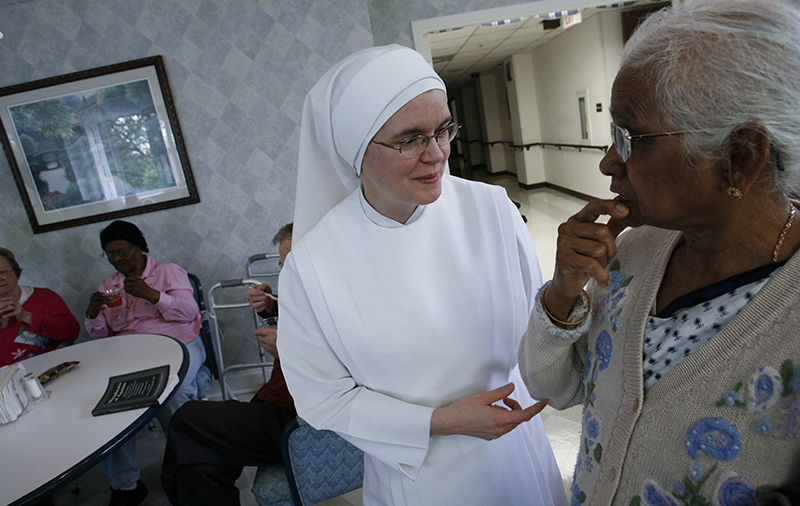A tongue-in-cheek definition of polling once described it as the fine art of phrasing questions the right way to get the result you want. That’s an injustice to reputable pollsters, of course, who strive to gauge opinion rather than manipulate it, but it does capture the reality that the way a choice is framed often influences how people make it.
That insight comes to mind in the wake of a new poll from the Pew Research Center, released Sept. 28, finding that two-thirds of Americans — including, by the way, a healthy majority of Catholics — believe that employers who have a religious objection to birth control nevertheless should be required to cover it in their employees’ health insurance plans.
The same poll also found that Americans are much more sharply divided over whether businesses with religious objections should be able to refuse services to same-sex couples and whether transgender persons should be able to use the bathroom of their choice.
At face value, the finding on contraception seems to conflict with a Marist College poll in April commissioned by the Knight of Columbus, asserting that 53 percent of Americans believe the mandate for contraception coverage imposed by the Obama administration as part of health care reform is “unfair,” while only 32 percent defended it.
Has American opinion really shifted dramatically over the last five months?
Perhaps, but a seemingly more plausible explanation for the divergence in results is that that Americans were actually being asked different questions, at least in terms of how many people likely interpreted the choices that were being put in front of them.
The Pew study, titled “Where the Public Stands on Religious Liberty vs. Nondiscrimination,” was to some extent focused on what people think of birth control. Unsurprisingly, it found that most American adults believe birth control is morally acceptable (36 percent) or not a moral issue at all (57 percent), while only 4 percent view contraception as morally wrong.
As a result, what the Pew survey was really asking was whether something most people regard as perfectly OK should be part of ordinary health care coverage, and it’s probably not a huge revelation to learn that the answer was “yes.”
(As a footnote, while 65 percent of American Catholics overall told the Pew survey that they believe employers should be required to cover contraception, as opposed to just 32 percent who disagreed, the split becomes much more narrow among Catholics who attend Mass at least once a week. Yet even among weekly Mass-going Catholics, only 13 percent see contraception as morally objectionable.)
The Marist poll in April asked what amounts to a different question. Here’s what people were asked to respond to:
“Some religious employers are fully exempt and don’t have to participate if it violates their religious beliefs,” the survey begins, referring to the insurance plans exempt from the contraception mandate. “But, other ministries with similar beliefs, including the Little Sisters of the Poor, are not exempt unless they sign a form directing their contractors to deliver such coverage through the ministries’ own health plan.”
“Which comes closer to your view,” the survey asks, “ ‘The process required by the government is fair to ministries like the Little Sisters’ or ‘This process required by the government is unfair to ministries like the Little Sisters?’ ”
Phrased that way, people were being asked to choose between an overweening federal government or an admirable ministry such as the Little Sisters of the Poor, and once again, it’s probably not a thunderclap that a strong majority chose the Little Sisters.
So what do we learn from the varying poll results?
First, probably, that there’s a strong majority in America, including within the American Catholic population, which has no beef with artificial contraception — seeing it for the most part as a matter of personal choice, and in some cases, probably, as morally laudable.
Whatever one makes of that in terms of official Catholic teaching, it’s been a settled fact of American sociology for a while, and the new Pew findings simply confirm it.
Second, that a strong majority of Americans also have enormous sympathy for selfless religious believers who spend themselves in service to others, such as the Little Sisters of the Poor, and they don’t like it when they perceive that the government is crimping their style and making life more difficult.
Phrase the debate over the mandates as a yes or no to the desirability of people being able to get birth control, in other words, and the answer in America is basically predestined to be “yes.” Phrase it as a yes or no to the Little Sisters being able to do their thing without being hampered by the state, on the other hand, and the answer once again is likely to be “yes.”
That root conflict between wanting birth control to be available to whoever desires it, and wanting groups such as the Little Sisters to be free to be true to themselves, is what makes the mandates debate so complex — and it’s also what makes polling on the question so prone to capture only part of a more complicated picture.
The Pew survey also reveals a striking degree of polarization in American attitudes, with only small percentages on both sides of the argument saying they sympathize with the views on the other. That may not bode well for the compromise solution the Supreme Court has clearly indicated it wants in the Zubik v. Burwell case, in which the Little Sisters are the most famous plaintiff, and for the prospects of future tensions around religious liberty issues.
This article origianlly appeared at the Catholic news site cruxnow.com

